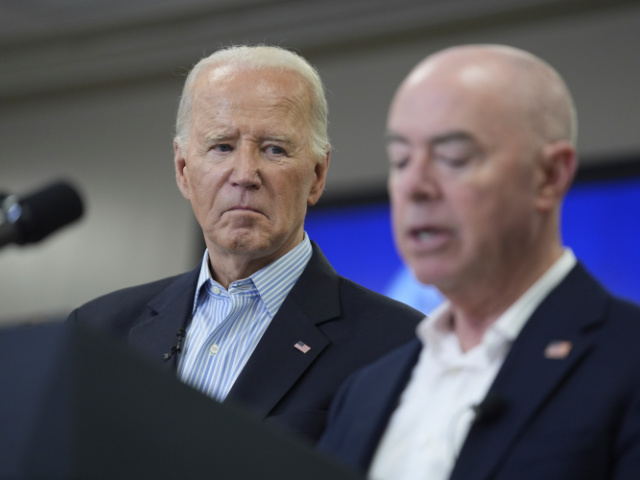The Department of Homeland Security (DHS) added 29 more Chinese entities to its list of exporters banned for suspected use of slavery, including companies that manufacture food and metals, from tomato paste to iron ore.
Chinese propaganda organs were predictably outraged by the UFLPA action. The state-run Global Times on Monday published an apoplectic editorial that portrayed “forced labor” as pure fiction created by American politicians and businessmen as an excuse to treat China unfairly.
“The U.S. is clearly using ‘human rights’ as a pretext to curb the development of Chinese enterprises, destabilize Xinjiang region [occupied East Turkistan] and contain China’s development,” railed Chinese Academy of Social Sciences research fellow Liu Weidong.
WATCH — “Here I Am!” — Trump Warns China over Taking Advantage of American Workers While He Was Gone:
Liu repeated the Chinese Communist Party’s mantra that “decoupling” from Chinese supply chains is “costly and unsustainable” for Western companies, as well as being a “shortsighted move that, in the long run, will negatively impact global economic stability and the interests of the U.S. itself.”
The Chinese Foreign Ministry accused U.S. officials of “spreading false stories on Xinjiang” and “illegally” sanctioning Chinese companies for imaginary human rights violations. Foreign Ministry spokesman Lin Jian claimed the UFLPA would only hurt the Uyghurs by depriving them of employment.
On Monday, the Global Times ran a propaganda piece intended to convince readers that the Uyghurs of East Turkistan have become happy and productive under China’s wise, if somewhat firm, stewardship. The piece included photos of smiling Uyghurs ostensibly delighted that China forced them to leave their homes and relocate to industrial and agricultural sites where they could find work.
Also on Monday, the Department of Homeland Security announced a very big name that might soon be added to the UFLPA entity list: Temu, the Chinese online retailer famed for its low prices. DHS said it was investigating Temu over allegations of using forced labor to produce goods at dirt-cheap prices.
DHS officials told the New York Post (NYP) that Temu has been under investigation for quite some time, but the Biden administration has been curiously reluctant to add it to the Entities List. That reluctance might end under the second Trump administration.

Homeland Security Alejandro Mayorkas delivers remarks during a visit to the southern border on February 29, 2024, in Brownsville, Texas, as President Joe Biden, looks on. (AP Photo/Evan Vucci)
“It’s just incredible that those guys can make a dress, ship it halfway around the world and sell it for, you know, $8 or something, and so those put all sorts of U.S. businesses out of business. And then comes in a question of, how do they do that?” former CIA intelligence officer Kevin Hulbert told the NYP.
“They do it probably by having really cheap cotton in their goods and stuff, and so that’s an issue. We shockingly allow Temu to self-certify that none of their cotton comes from the Xinjiang province, which is where slave labor is used,” Hulbert said.
The DHS action announced last Wednesday was the first time China-based companies that export steel or aspartame sweeteners have been added to the Uyghur Forced Labor Prevention Act (UFLPA) Entity List.
The UFLPA is a law that took effect in January 2022, banning imports of products that might be tainted by forced labor from the oppressed Uyghur Muslims of occupied East Turkistan, which China refers to as Xinjiang province. The law presumes nearly all exports from Xinjiang have been contaminated with forced labor at some point in their production chains, unless the export company can prove otherwise.
With the latest 29 additions – the largest number added in a single action since 2022 – the number of entities on the UFLPA ban list stands at 107. It will most likely be the last forced-labor enforcement action of the outgoing Biden administration.
“Today’s enforcement actions make it clear: the United States will not tolerate forced labor in the goods entering our markets,” said DHS Under Secretary for Policy Robert Silvers, who chairs the Forced Labor Enforcement Task Force (FLETF).
“The Uyghur Forced Labor Prevention Act is a powerful tool in the fight against forced labor, and we are using it to its full potential. We urge companies to take responsibility, know their supply chains, and act ethically,” Silvers said on Wednesday.
WATCH — Harshbarger: U.S. “Dependent” on Foreign Countries Supplying Medical Ingredients Needed for Survival:
Twenty-three of the 29 new additions are agricultural companies, while the others mine or process minerals such as copper, lithium, beryllium, nickel, manganese, and gold. Solar power and textiles were among the first industries to be heavily impacted by the UFLPA, but recently the U.S. government has been taking a closer look at Chinese metals and seafood products.
Critics of the Biden administration claim enforcement has been too lax, but they expect it to become much more vigorous under President-elect Donald Trump and his Secretary of State nominee, Sen. Marco Rubio (R-FL), who was a sponsor of the Uyghur Forced Labor Prevention Act.
Rubio sent a letter to DHS Secretary Alejandro Mayorkas on October 31, complaining that the Biden administration has not used the tools provided by the UFLPA aggressively enough against certain Chinese pharmaceutical companies.
“The Uyghur Forced Labor Prevention Act assures the American people that the products they purchase were made without slave labor. It is clear that the lack of oversight by the FDA (Food and Drug Administration) has not made this true,” Rubio wrote.
“The FDA and DHS have a responsibility to rectify this dangerous error and uphold the law,” Rubio told Mayorkas.

COMMENTS
Please let us know if you're having issues with commenting.